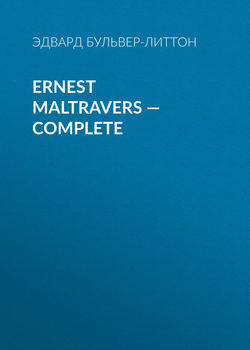Читать книгу Ernest Maltravers — Complete - Эдвард Джордж Бульвер-Литтон, Эдвард Бульвер-Литтон - Страница 24
ERNEST MALTRAVERS BOOK II CHAPTER IV
Оглавление“Most dangerous
Is that temptation that does goad us on
To sin in loving virtue.”
—Measure for Measure.
“SEE her to-morrow!—that morrow is come!” thought Maltravers, as he rose the next day from a sleepless couch. Ere yet he had obeyed the impatient summons of Ferrers, who had thrice sent to say that “he never kept people waiting,” his servant entered with a packet from England, that had just arrived by one of those rare couriers who sometimes honour that Naples, which might be so lucrative a mart to English commerce, if Neapolitan kings cared for trade, or English senators for “foreign politics.” Letters from stewards and bankers were soon got through; and Maltravers reserved for the last an epistle from Cleveland. There was much in it that touched him home. After some dry details about the property to which Maltravers had now succeeded, and some trifling comments upon trifling remarks in Ernest’s former letters, Cleveland went on thus:
“I confess, my dear Ernest, that I long to welcome you back to England. You have been abroad long enough to see other countries; do not stay long enough to prefer them to your own. You are at Naples, too—I tremble for you. I know well that delicious, dreaming, holiday-life of Italy, so sweet to men of learning and imagination—so sweet, too, to youth—so sweet to pleasure! But, Ernest, do you not feel already how it enervates?—how the luxurious far niente unfits us for grave exertion? Men may become too refined and too fastidious for useful purposes; and nowhere can they become so more rapidly than in Italy. My dear Ernest, I know you well; you are not made to sink down into a virtuoso, with a cabinet full of cameos and a head full of pictures; still less are you made to be an indolent cicisbeo to some fair Italian, with one passion and two ideas: and yet I have known men as clever as you, whom that bewitching Italy has sunk into one or other of these insignificant beings. Don’t run away with the notion that you have plenty of time before you. You have no such thing. At your age, and with your fortune (I wish you were not so rich), the holiday of one year becomes the custom of the next. In England, to be a useful or a distinguished man, you must labour. Now, labour itself is sweet, if we take to it early. We are a hard race, but we are a manly one; and our stage is the most exciting in Europe for an able and an honest ambition. Perhaps you will tell me you are not ambitious now; very possibly—but ambitious you will be; and, believe me, there is no unhappier wretch than a man who is ambitious but disappointed,—who has the desire for fame, but has lost the power to achieve it—who longs for the goal, but will not, and cannot, put away his slippers to walk to it. What I most fear for you is one of these two evils—an early marriage or a fatal liaison
